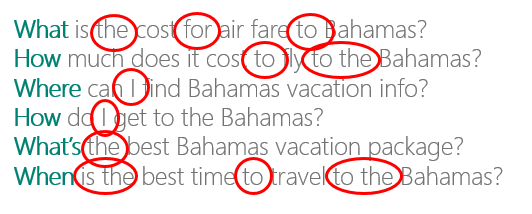Strategy
Industry Update
The Rise of Voice Searches Pt. 3: Digital Advertising
June 12, 2019
Industry Update
June 12, 2019
Nowadays, consumers are trying to get the most, while doing the least. Voice Search is a great example of this, as they can now get things done without having to lift a finger! Want to know what the weather is like today? You don’t even have to look outside anymore. Tired of your phone and want a new one? No more need to even touch the old one to find ‘2019’s best camera smartphone’. A simple ‘OK Google, Alexa or hi Siri’ will do just fine, helping you get the job done. – What a time to be alive!
This Voice Search evolution has created many interesting opportunities for businesses to interact with their customers at this new touchpoint. Whenever something new arises, there’s always a period of finding out what works and trying to prepare for this to the best of your abilities.
In this blog, we’re going to talk about the things you definitely need to know when it comes to the future of Voice Search and Digital Advertising!
Being entirely focused on making life easier for its users, Voice Search is all centred around convenience and efficiency. The results you are presented with after your search will normally be just one, requiring it to effectively solve your need.
We’ve already discussed some of the basics of Voice Search and the practices you should follow in order to make your content Voice Search ready so that you can increase your chances of coming up for this one result, but what does this have to do with digital advertising?
Let’s say Jamie is all set to bake a pizza, all from scratch and leverages. She might ask the voice assistant for ‘the best homemade pizza recipe’ in the hopes of making a Michelin star meal. Now, the result for this query will most likely give her a list of steps to follow that will include the ingredients and actions needed.
This would be a great scenario in which a relevant Voice advertisement could be placed! How? Imagine that before the result for the search query is given, an ad for a promotion deal for Hetty Spagetthi’s tasty pizza dough is played.
It would be directly relevant to the search and it could just help Jamie out as she now not only has a delicious recipe, but also knows about this great deal which will help her skip the first 6 steps.

Sounds great right? The consumer got what she wanted and possibly discovered her new favourite pizza dough brand, and Hetty got to acquire a new customer while reaching her through a new touchpoint. In this situation, – yes.
So, what if Jamie made the same Voice Search, but before she could get to the recipe she had to listen to an ad about the latest version of a new mobile game. Not related to her search in any kind of way. Instead, she had to wait and listen for the ad to end before she can finally get the result she was hoping for.
In this scenario, the ad was irrelevant to her search, wasted her time and potentially was negatively evaluated. -Bad, bad, bad.
As of now, advertising through Voice Search is not yet possible on the devices currently available. Providers indicate they don’t want to negatively influence their users’ experiences while using their products. This did not stop many from speculating about the possibilities in the near future, nor from doing research on consumer’s perception of Voice Search advertisements.
Insights provided by Google showed that 52% of consumers who own smart speakers would actually like brands to provide information about promotions and deals, in addition to 48% who would like to receive personalized tips that will simplify their lives. Maybe most importantly, 62% expected to buy something through the use of their smart speaker in the month after.
Now those are promising figures!
Taking this all into account, there are some things you should consider if you want to dive into the Voice Search advertising in the future.
Most resources online discuss the importance of PPC (Pay Per Click) strategies to test the potential for Voice Search ads for your business. As mentioned in our previous blog, Voice Search queries are often quite a lot longer than ‘normal’ searches and are more conversational, instead of the choppy queries we usually see. Therefore, if you want to test out the waters with Voice Search advertising, purchasing long-tail keywords in your PPC campaigns is recommended. A piece written by Purna Virji on Moz, also advised businesses to bid on filler words, such as in the image below.

As we discussed earlier in this post, results for Voice Searches should effectively match the search made as only one result is often given. Voice Search assistants get their strength from providing the user with a highly personalised experience and so should be the ad.
Although the majority of marketing and advertising strategies are focused on being optimised for Google, in Voice Search Bing should definitely not be missed! Out of the four main voice assistants, three (Siri, Cortana and Alexa) get their results from Bing. It shouldn’t be a surprise to hear that Google’s voice assistant uses Google instead. Considering this point, be sure to optimise your strategies for both search machines!
However, not everybody is as stoked about potential advertisements through Voice Search. This became clear after Google received major backlash after one Google Home user got surprised with a promotion for the (then) new Beauty & the Beast movie after asking for his schedule of that day.
A spokesperson of Google, however, told 9to5Google “This wasn’t intended to be an ad. What’s circulating online was a part of our My Day feature, where after providing helpful information about your day, we sometimes call out timely content. We’re continuing to experiment with new ways to surface unique content for users and we could have done better in this case.”
Don’t worry, it’s easy to see what went wrong in this situation and what should have been done instead! As mentioned before, consumers want an experience tailored to their personal wants and needs. In this example an ad for a movie was played after the user asked for his schedule of the day, a good example of an irrelevant result or response to the Voice Search that was made. This could be avoided by ensuring that the ads that are given to the users actually match their search intend!
In this blog, we’ve discussed some of the most important things you should know if you want to dive into the world of Voice Search and Digital Advertising. We’ve gone over some possible scenarios in which voice ads could be applied, why these ads should be focused on the user’s experience, what to do and what not to do, as well as a few things to consider.
We’re curious to find out what more developments are to be seen for Voice Search in the future! What are your thoughts on Voice Search and advertising? Let us know in the comments below!